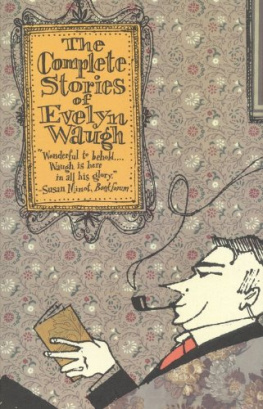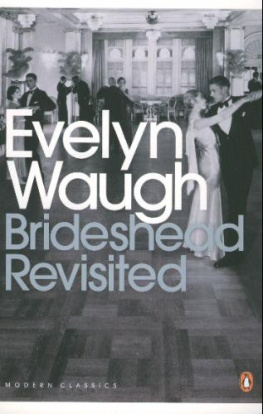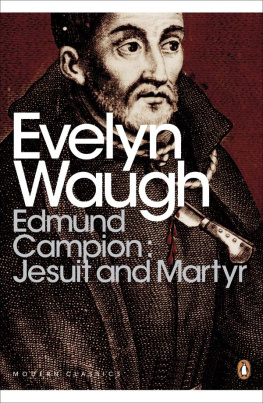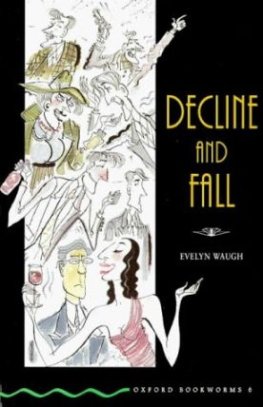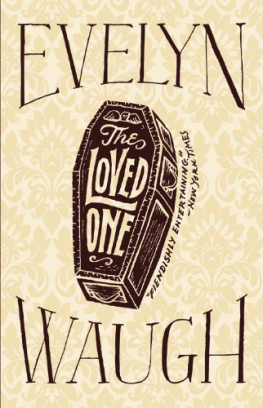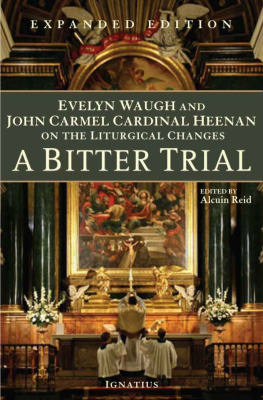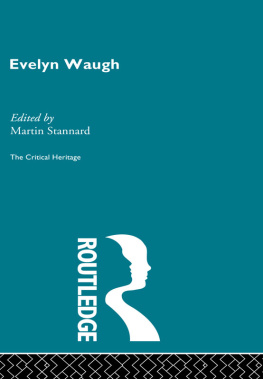Evelyn Waugh - Men at Arms (Book One of the Sword of Honour Trilogy)
Here you can read online Evelyn Waugh - Men at Arms (Book One of the Sword of Honour Trilogy) full text of the book (entire story) in english for free. Download pdf and epub, get meaning, cover and reviews about this ebook. year: 2000, publisher: Little Brown, genre: History. Description of the work, (preface) as well as reviews are available. Best literature library LitArk.com created for fans of good reading and offers a wide selection of genres:
Romance novel
Science fiction
Adventure
Detective
Science
History
Home and family
Prose
Art
Politics
Computer
Non-fiction
Religion
Business
Children
Humor
Choose a favorite category and find really read worthwhile books. Enjoy immersion in the world of imagination, feel the emotions of the characters or learn something new for yourself, make an fascinating discovery.

- Book:Men at Arms (Book One of the Sword of Honour Trilogy)
- Author:
- Publisher:Little Brown
- Genre:
- Year:2000
- Rating:4 / 5
- Favourites:Add to favourites
- Your mark:
- 80
- 1
- 2
- 3
- 4
- 5
Men at Arms (Book One of the Sword of Honour Trilogy): summary, description and annotation
We offer to read an annotation, description, summary or preface (depends on what the author of the book "Men at Arms (Book One of the Sword of Honour Trilogy)" wrote himself). If you haven't found the necessary information about the book — write in the comments, we will try to find it.
Men at Arms (Book One of the Sword of Honour Trilogy) — read online for free the complete book (whole text) full work
Below is the text of the book, divided by pages. System saving the place of the last page read, allows you to conveniently read the book "Men at Arms (Book One of the Sword of Honour Trilogy)" online for free, without having to search again every time where you left off. Put a bookmark, and you can go to the page where you finished reading at any time.
Font size:
Interval:
Bookmark:
Evelyn Waugh Men At Arms
First published in 1952
PROLOGUE
Sword of Honour
WHEN Guy Crouchback's grandparents, Gervase and Hermione, came to Italy on their honeymoon, French troops manned the defences of Rome, the Sovereign Pontiff drove out in an open carriage and Cardinals took their exercise sidesaddle on the Pincian Hill.
Gervase and Hermione were welcomed in a score of frescoed palaces. Pope Pius received them in private audience and gave his special blessing to the union of two English families which had suffered for their Faith and yet retained a round share of material greatness. The chapel at Broome had never lacked a priest through all the penal years and the lands of Broome stretched undiminished and unencumbered from the Quantocks to the Blackdown Hills. Forbears of both their names had died on the scaffold. The City, lapped now by the tide of illustrious converts, still remembered with honour its old companions in arms.
Gervase Crouchback stroked his side-whiskers and found a respectful audience for his views on the Irish question and the Catholic missions in India. Hermione set up her easel among the ruins and while she painted Gervase read aloud from the poems of Tennyson and Patmore. She was pretty and spoke three languages; he was all that the Romans expected of an Englishman. Everywhere the fortunate pair were praised and petted but all was not entirely well with them. No sign or hint betrayed their distress but when the last wheels rolled away and they mounted to their final privacy, there was a sad gap between them, made by modesty and tenderness and innocence, which neither spoke of except in prayer.
Later they joined a yacht at Naples and steamed slowly up the coast, putting in at unfrequented harbours. And there, one night in their state room, all at last came right between them and their love was joyfully completed.
Before they fell asleep they felt the engines stop and heard the rattle of the anchor-chain, and when Gervase came on deck at dawn, he found that the ship lay in the shelter of a high peninsula. He called Hermione to join hire and, so standing together hand-in-hand, at the moist taffrail, they had their first view of Santa Dulcina delle Rocce and took the place and all its people into their exulting hearts.
The waterfront was thronged as though the inhabitants had been shaken from bed by an earthquake; their voices came clearly across the water, admiring the strange vessel. Houses rose steeply from the quay; two buildings stood out from the ochre and white walls and rusty pantiles, the church domed, with a voluted facade, and a castle of some kind comprising two great bastions and what seemed a ruined watch-tower. Behind the town for a short distance the hillside was terraced and planted, then above broke wildly into boulders, and briar. There was a card game which Gervase and Hermione had played together in the schoolroom in which the winner of a trick called, 'I claim.'
'I claim,' cried, Hermione, taking possession of all she saw by right of her happiness.
Later in the morning the English party landed. Two sailors went first to prevent any annoyance from the natives. There followed four couple of ladies and gentlemen; then the servants carrying hampers and shawls and sketching materials. The ladies wore yachting caps and held their skirts clear of the cobbles; some carried lorgnettes. The gentlemen protected them with fringed sunshades. It was a procession such as Santa Dulcina delle Rocce had never seen, before. They sauntered through the arcades, plunged, briefly into the cool twilight of the church and climbed the steps which led from the piazza to the fortifications.
Little remained. The great paved platform was broken everywhere with pine and broom. The watch-tower was full of rubble. Two cottages had been built in the hillside from the finely cut masonry of the old castle and two families of peasants ran out to greet them with bunches of mimosa. The picnic luncheon was spread in the shade.
'Disappointing when you get up here,' said the owner of the yacht apologetically. 'Always the way with these places. Best seen from a distance.'
'I think it's quite perfect,' said Hermione, 'and we're going to live here. Please don't say a word against our castle.'
Gervase laughed indulgently with the others but later, when his father died and he seemed to be rich, the project came to life. Gervase made inquiries; The castle belonged to an elderly lawyer in Genoa who was happy to sell. Presently a plain square house rose above the ramparts and English stocks added their sweetness to the myrtle and the pine. Gervase called his new house the Villa Hermione, but the name never caught the local fancy. It was cut in large square letters on the gate-posts but honeysuckle spread and smothered it. The people of Santa Dulcina spoke always of the 'Castello Crouchback' until eventually that title found its way to the head of the writing-paper and Hermione, proud bride, was left without commemoration.
Whatever its name, however, the Castello kept the character of its origin. For fifty years, until the shadows closed on the Crouchback family, it was a place of joy and love. Guy's father and Guy himself came there for their honeymoons. It was constantly lent to newly married cousins and friends. It was the place of Guy's happiest holidays with his brothers and sister. The town changed a little but neither railway nor high road touched that happy peninsula. A few more foreigners built their villas there, The inn enlarged itself, installed sanitation of a sort and a cafe-restaurant, took the name of 'Hotel Eden' and abruptly changed it during the Abyssinian crisis to 'Albergo del Sol'. The garage proprietor became secretary of the local Fascists. But as Guy descended to the piazza on his last morning, he saw little that would have been unfamiliar to Gervase and Hermione. Already, an hour before midday, the heat was fierce but he walked as blithely as they on that first morning of secret jubilation. For him, as for them, frustrated love had found its first satisfaction. He was packed and dressed for a long journey, already on his way back to his own country to serve his King.
Just seven days earlier he had opened his morning newspaper on the headlines announcing the Russian-German alliance. News that shook the politicians and young poets of a dozen capital cities brought deep peace to one English heart. Eight years of shame and loneliness were ended. For eight years - Guy, already set apart from his fellows by his own deep wound,; that unstaunched, internal draining away of life and love, had been deprived of the loyalties which should have sustained him. He lived too close to Fascism in Italy to share the opposing enthusiasms of his countrymen. He saw it neither as a calamity nor as a rebirth; as a rough improvisation: merely. He disliked the men who were edging, themselves into power, around him, but English denunciations sounded fatuous and dishonest and for the past three years he had given up his English newspapers. The German Nazis he knew to be mad and bad. Their participation dishonoured the cause of Spain, but the troubles of Bohemia, the year before, left him quite indifferent When Prague fell, he knew that war was inevitable. He expected his country to go to war in a panic, for the wrong reasons or for no reason at all, with the wrong allies, in pitiful weakness. But now, splendidly, everything had become clear. The enemy at last was plain in view, huge and hateful, all disguise cast off. It was the Modern Age in arms. Whatever the outcome there was a place for him in that battle.
Everything was now in order at the Castello. His formal farewells were made. The day before he had visited the Arciprete, the Podesta, the Reverend Mother at the Convent, Mrs Garry at the Villa Datura, the Wilmots at the Castelletto Musgrave, Grafin von Gluck at the Casa Gluck. Now there was a last piece of private business to transact. Thirty-five years old, slight and trim, plainly foreign but not so plainly English, young now, in heart and step, he came to bid good-bye to a life-long friend who lay, as was proper for a man dead eight hundred years, in the parish church.
Next pageFont size:
Interval:
Bookmark:
Similar books «Men at Arms (Book One of the Sword of Honour Trilogy)»
Look at similar books to Men at Arms (Book One of the Sword of Honour Trilogy). We have selected literature similar in name and meaning in the hope of providing readers with more options to find new, interesting, not yet read works.
Discussion, reviews of the book Men at Arms (Book One of the Sword of Honour Trilogy) and just readers' own opinions. Leave your comments, write what you think about the work, its meaning or the main characters. Specify what exactly you liked and what you didn't like, and why you think so.

